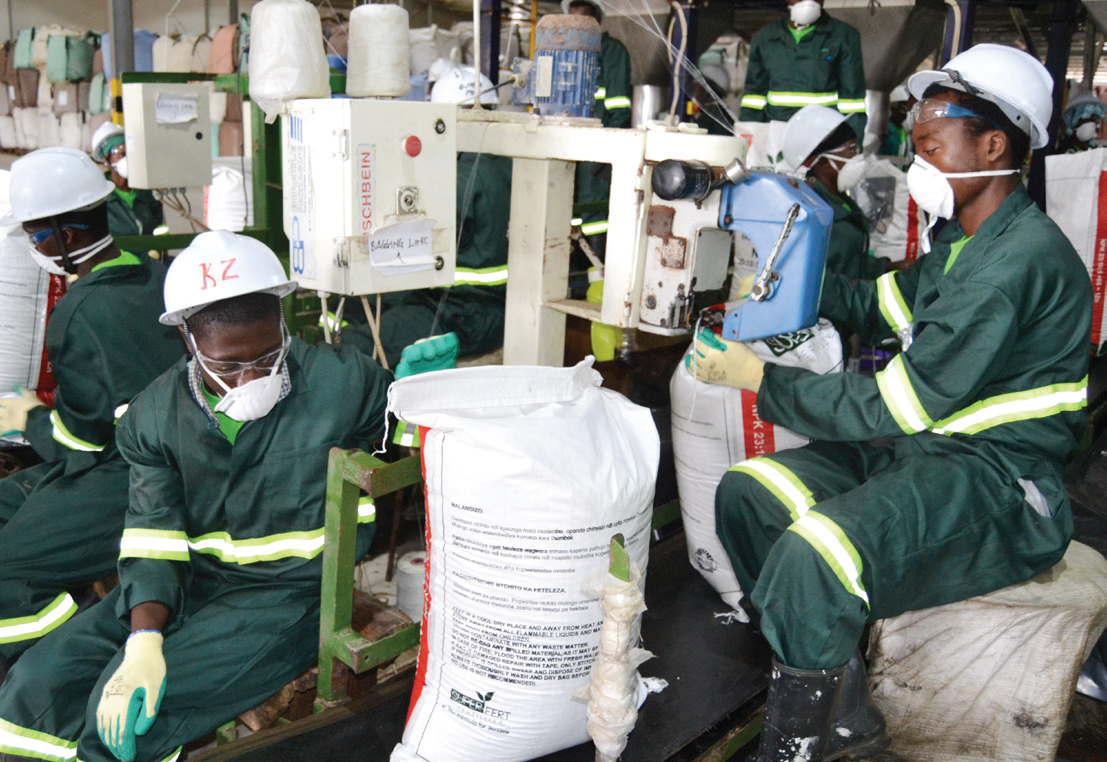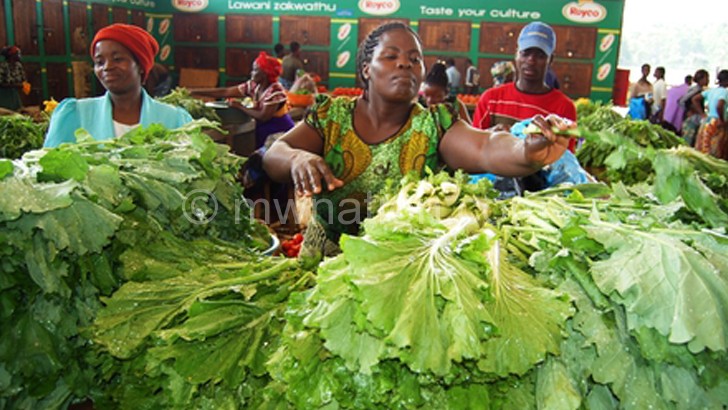Manufacturing sector growth under pressure
Malawi’s manufacturing sector is facing significant challenges due to a combination of factors, including restrictive tax regimes and contractionary monetary policies, local entrepreneurs and industry experts have said.
The policies are said to be stifling innovation and making it difficult for local manufacturers to compete on the global market.

National Working Group on Trade Policy chairperson Frederick Changaya, in an interview on Friday, blamed tight monetary policy for raising the cost of borrowing while National Planning Commission (NPC) director general Thomas Chataghalala Munthali argues that it hinders investment due to underutilised production factors.
He said: “We have factors of production such as land that is lying idle.
“If the government reduced interest rates and made borrowing cheaper, people would borrow to complete those projects. We will be getting closer to our goal of industrialisation.”
The Reserve Bank of Malawi has raised the policy rate as a lender of last resort, the rate at which commercial banks borrow from the central bank, by 1 400 basis points from 12 percent in 2020 to 26 percent this year.
During the same period, commercial bank interest rates have gone up by 12 percent to 25.1 percent .
Investment banker and strategist Misheck Esau said in an interview on Friday that high interest rates discourage investment in manufacturing facilities while limited access to finance, particularly for small and medium enterprises, further restricts growth.
He also faulted the government procurement policies that favour imported goods over locally produced ones.
Said Esau: “Government’s own procurement policiesare to blame because they favour imports over locally produced goods.
“This is prevalent in the education, health and agriculture sectors just to name a few.”
Malawi Confederation of Chambers of Commerce and Industry and Sparc Systems Limited founder Wisely Phiri said that tax laws are hindering innovation.
He said: “We also have taxes that are barring innovation.
“For example, on computer parts, there is a 25 percent duty which is removed when you buy a fully assembled computer. This is making the cost of innovation expensive.”
In a separate interview, Mtalimanja Holdings founder and investor Napoleon Dzombe said high production costs have an impact on local production.
“The high interest rates and utility bills drive up our production costs. If the production costs are high, it makes our products much more expensive than those of our competitors,” he said.
Dzombe said the challenges collectively threaten to cripple Malawi’s manufacturing sector, hindering its potential to contribute to the country’s economic transformation.
The manufacturing sector experienced a contraction in 2022, with a growth estimated at negative 1.4 percent from a growth of 4.1 percent in 2021, according to the Malawi Government Annual Economic Report 2024. In 2023, the industry’s growth was estimated at 0.4 percent in 2024 and 2025, the sector is projected to grow at 4.4 percent and 4.6 percent, respectively.






Hot girls are waiting for you on —– https://u.to/sYM6IA
https://bogin99.z1.web.core.windows.net/research/bogin99-(135).html
The cowl neck adds some very delicate intercourse attraction, the ruching helps to hide
any lumps and bumps and the 3D flowers add a sense of luxurious.
https://tendoncare4b.z7.web.core.windows.net/research/tendoncare4b-(459).html
This mom selected a royal blue gown with an phantasm neckline and a floral overlay for a striking big-day look.
https://filedn.eu/lXvDNJGJo3S0aUrNKUTnNkb/tendoncare22/research/tendoncare22-(166).html
If you can find something with flowers even when it’s lace or embroidered.
https://filedn.eu/lXvDNJGJo3S0aUrNKUTnNkb/tendoncare2/research/tendoncare2-(30).html
This gown’ dreamy chiffon cape feels ceremonial and refined,
and is easily removed to reveal a slinkier metallic sheath underneath for dinner and dancing.
https://accounting25.fra1.digitaloceanspaces.com/research/accounting25-(163).html
There are loads of choices obtainable for plus dimension mother of the bride dresses.
http://asia-course-3.s3-website.ca-central-1.amazonaws.com/research/asia-course-3-(122).html
“She bought it on a whim and ended up successful,” the bride mentioned.
https://bogin8.sfo2.digitaloceanspaces.com/research/bogin8-(295).html
Purchases made through links on this page could earn us a fee.
https://accounting-7.syd1.digitaloceanspaces.com/research/accounting-7-(492).html
Otherwise, pictures will appear off-balanced, and it might be misconstrued
that one mom is making an attempt to outshine or outdo the other.
https://drbo4b.z7.web.core.windows.net/research/drbo4b-(116).html
Browse by scoop necklines or try the strapless options.
https://storage.googleapis.com/catering34/research/catering34-(437).html
With cap sleeves and an phantasm neckline, this fitted blue
beauty was excellent for this D.C.
https://accounting009.netlify.app/research/accounting009-(70)
Grab amazing online offers on mother of the bride clothes now and get free transport within the United States.
https://drbo4b.s3.us-east-005.backblazeb2.com/research/drbo4b-(117).html
Light, sunny, and normally filled with flowers, and they typically use pastel
colours impressed by springtime blooms.
https://drbo10b.s3.us-east-005.backblazeb2.com/research/drbo10b-(105).html
We are picturing this superbly embroidered robe for
a yard or garden wedding set amongst romantic flowers
and rich greenery.
https://filedn.eu/lXvDNJGJo3S0aUrNKUTnNkb/accounting24/research/accounting24-(95).html
This black costume is ideal if you are in search of something extra traditional.
https://accounting019.netlify.app/research/accounting019-(291)
There normally aren’t any set rules in terms of MOB outfits for the wedding.
https://digi6.research.au-syd1.upcloudobjects.com/research/digi6-(487).html
However, many trendy girls use this recommendation as extra of a suggestion than a
strict rule.
https://accounting17.ams3.digitaloceanspaces.com/research/accounting-17-(15).html
We even have tea-length attire and lengthy dresses to swimsuit any
season, venue or desire.
https://accounting008.netlify.app/research/accounting008-(313)
Discover fashionable jumpsuits and dresses with complementing jackets, fascinators,
sneakers and equipment to complete your look.
https://filedn.eu/lXvDNJGJo3S0aUrNKUTnNkb/accounting24/research/accounting24-(277).html
Next, contemplate what silhouettes work greatest in your physique kind and what features you’d
like to highlight.
https://filedn.eu/lXvDNJGJo3S0aUrNKUTnNkb/bogin3/research/bogin3-(145).html
A purple lace Erdem dress, embroidered with pink and crimson blooms, paired completely with this fashionable mother’s half-up, half-down coiffure.
https://tendoncare4.fra1.digitaloceanspaces.com/research/tendoncare4-(157).html
Browse through the new collection of Mother of the Bride robes 2021.
https://drbo6b.b-cdn.net/research/dobo6b-(53).html
For the mother who likes to look put collectively and trendy,
a jumpsuit in slate gray is certain to wow.
https://bogin013.netlify.app/research/bogin013-(509)
A matching white choker topped off this mother-of-the-bride’s look, which was also complemented by a chic low bun.
https://accounting004.netlify.app/research/accounting004-(260)
Add a metallic heeled sandal or pump and also you’re
good to go.
https://accounting26.sgp1.digitaloceanspaces.com/research/accounting26-(241).html
Teri Jon has a big number of plus size evening gowns, and some even with
extended sizing to size 20.
https://tendoncare5.b-cdn.net/research/tendoncare5-(300).html
Modest meets insanely fashionable in this silky Amsale robe that includes a column silhouette
and off-the-shoulder neckline.
https://accounting17.research.au-syd1.upcloudobjects.com/research/accounting17-(35).html
Express your love with handmade Valentine’s crafts like paper cards,
gift ideas, and decorations.
http://chinavisa24.s3-website.eu-central-2.amazonaws.com/
This will full your outfit and produce it collectively
as a complete.
https://accounting005.netlify.app/research/accounting005-(286)
This is extra of a personal selection that’s determined between you and your daughter.
https://drbo2b.z8.web.core.windows.net/research/drbo2B-(484).html
The entire collection is crafted with high quality materials for weddings or any other particular occasion!
https://tendoncare8.nyc3.digitaloceanspaces.com/research/tendoncare8-(267).html
The mom of the bride and groom ought to costume in a method that doesn’t
conflict however isn’t too matchy-matchy either.
https://accounting021.netlify.app/research/accounting021-(413)
This mother of the bride outfit channels pure femininity.
http://catering124.s3-website.eu-central-2.amazonaws.com/research/catering124-(436).html
Much just like the mother of the groom, step-mothers of both the
bride or groom should follow the lead of the mother of the bride.
http://catering117.s3-website.eu-central-1.amazonaws.com/research/catering117-(151).html
With over 3000 stores in america and worldwide, purchasing has become
so easy.
https://filedn.eu/lXvDNJGJo3S0aUrNKUTnNkb/bogin1C/research/bogin2C-(381).html
Find the right tie styles for 2021 and past on your marriage ceremony.
Rachel Weisz have that mysterious look and she is very appealing to most men and women,,